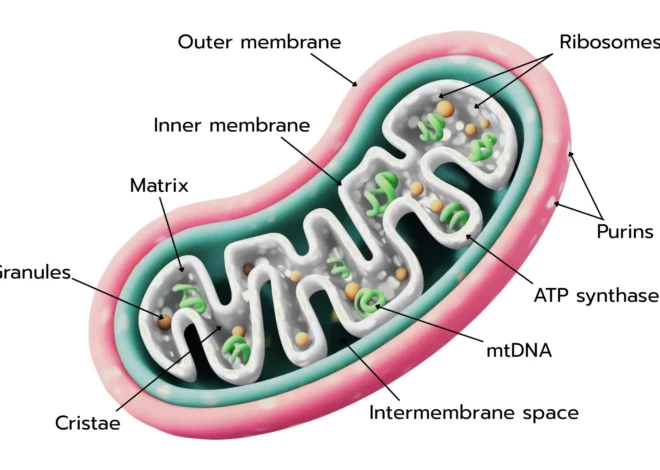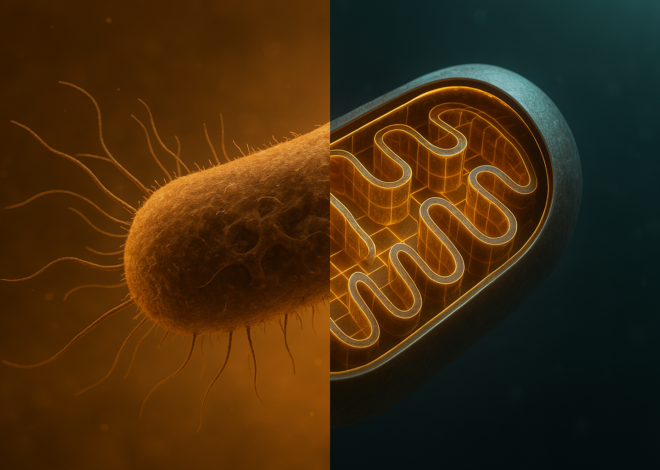
How Mitochondria Affect Weight Loss & Metabolism
Table of Contents

If you’ve ever struggled to lose weight despite eating healthy and exercising regularly, your metabolism might be working against you.
Many people don’t realize that the tiny “powerhouses” inside your cells — called mitochondria — play a huge role in how efficiently your body burns fat for fuel. When your mitochondria aren’t functioning at their best, your metabolism can slow down, making it harder to shed stubborn pounds and keep your energy levels high.
In this guide, you’ll learn how mitochondria influence weight loss and metabolism, what signs to watch for if yours are underperforming, and practical steps you can take to naturally boost your body’s fat-burning power.
The Link Between Mitochondria and Metabolism
Your metabolism depends on how efficiently your body converts food into usable energy. This entire process happens deep inside your cells — and mitochondria are at the heart of it. Often called the “powerhouses” of the cell, mitochondria generate ATP (adenosine triphosphate), which is the main source of energy your body uses for every function, including burning fat.
When your mitochondria are healthy and working optimally, they help your body break down nutrients and turn stored fat into energy more effectively. But when your mitochondria become sluggish or damaged — a condition known as mitochondrial dysfunction — your cells can’t burn fuel efficiently. This slowdown can contribute to weight gain, stubborn fat, and low energy levels.
In video below will show how our body turn food into energy
In fact, multiple studies have found that poor mitochondrial function is linked to obesity and metabolic disorders. Research published in Frontiers in Endocrinology explains how impaired mitochondria reduce fat oxidation and energy expenditure, making weight management much more challenging. Reference: Front Endocrinol (Lausanne). 2019; 10: 532.
Signs Your Mitochondria Need Help!
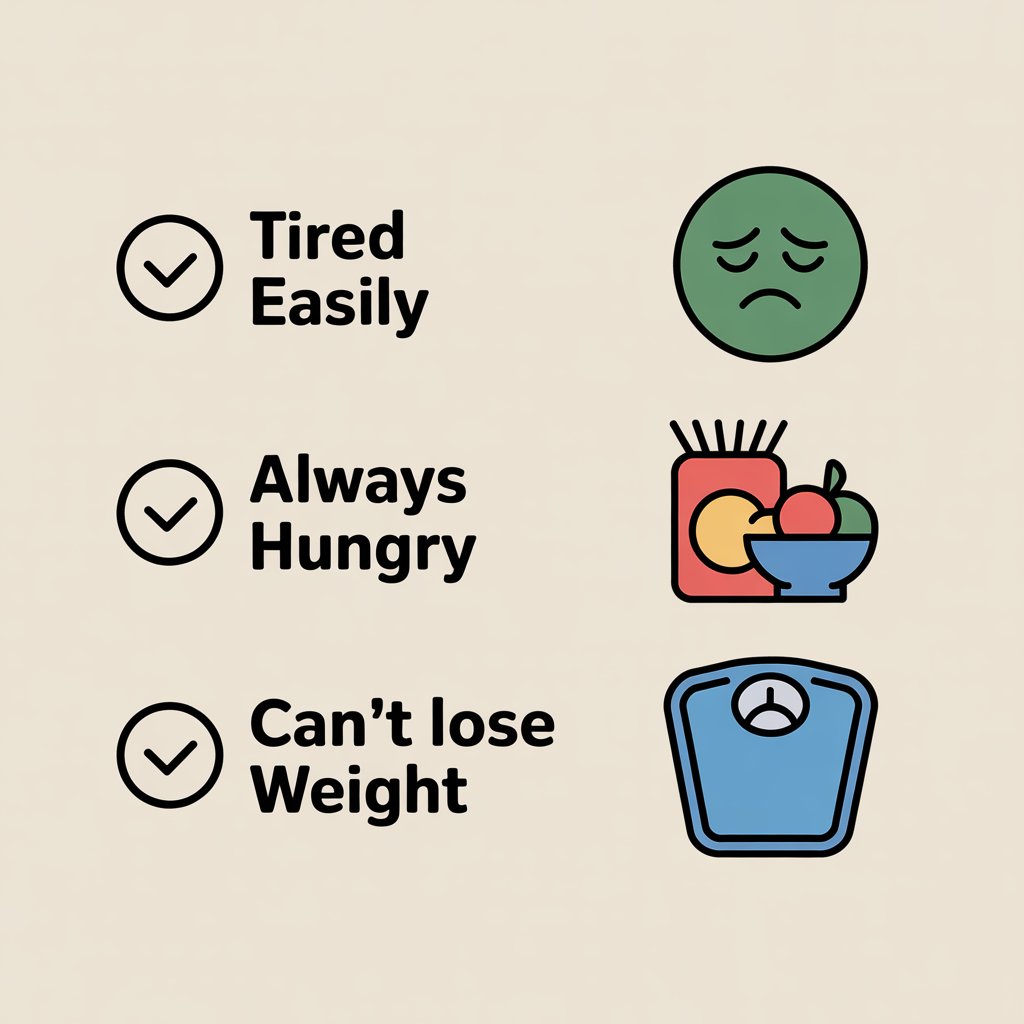
How can you tell if sluggish mitochondria might be making it harder for you to lose weight? Here are some common signs to watch for:
- You feel tired all the time — Even when you’re getting enough sleep, poor mitochondrial function can leave you feeling drained because your cells aren’t producing enough energy.
- You feel hungry more often — When your cells can’t turn food into energy efficiently, your body may send out hunger signals more frequently, pushing you to eat more than you need.
- You struggle to lose weight even on a calorie deficit — If your mitochondria aren’t burning fat effectively, cutting calories alone may not be enough to get the scale moving.
If you notice these signs, it could be a clue that your metabolism needs extra support — starting with taking care of your mitochondria.
Want to know what you can do about it? Jump to our practical tips on how to support your mitochondria for better fat burning.
Foods & Nutrients That Support Mitochondria for Weight Loss
One of the best ways to help your mitochondria work better is through your diet. Certain foods and nutrients can give your cells the raw materials they need to produce energy and burn fat more efficiently.
✔️ Eat more leafy greens: Vegetables like spinach, kale, and Swiss chard are packed with antioxidants and B vitamins that protect mitochondria and help them function properly.
✔️ Include healthy fats: Foods rich in omega-3 fatty acids — like salmon, mackerel, walnuts, and chia seeds — support the membranes of your cells and mitochondria, helping them do their job.
✔️ Drink black coffee (in moderation): Studies suggest that moderate coffee consumption can boost thermogenesis (your body’s calorie-burning process) and may help support healthy mitochondria too.
✔️ Consider key nutrients: Certain compounds are especially helpful for mitochondrial health and fat burning:
- CoQ10 (Coenzyme Q10): Acts as a spark plug for mitochondria, helping generate ATP.
- PQQ (Pyrroloquinoline Quinone): May encourage the growth of new mitochondria (a process called mitochondrial biogenesis).
- L-carnitine: Helps transport fatty acids into the mitochondria so they can be burned for fuel.
👉 Tip: If you can’t get enough of these nutrients through diet alone, some high-quality supplements — like Mitolyn — combine these ingredients to help your mitochondria work their best.
| Category | Example Foods / Nutrients | How They Help Mitochondria & Fat Burning |
| Leafy Greens | Spinach, kale, Swiss chard | Rich in B vitamins & antioxidants > Protect mitochondria from damage |
| Healthy Fats | Salmon, mackerel, walnuts, chia seeds | Omega-3s strengthen cell & mitochondrial membranes |
| Black Coffee | Unsweetened black coffee | Increases thermogenesis & may boost mitochondrial efficiency |
| CoQ10 (nutrient) | Supplements or organ meats (heart, liver) | Supports ATP production, main fuel for cells |
| PQQ (nutrient) | Supplements, trace amounts in fermented soy, kiwi | Promotes mitochondrial biogenesis (creation of new mitochondria) |
| L-carnitine (nutrient) | Red meat, fish, dairy, supplements | Transports fat into mitochondria for burning as energy |
Can Supplements Help?
Eating a healthy diet and staying active are the foundations of good metabolism — but sometimes, your body might need extra support to help your mitochondria work their best. That’s where certain supplements can come in.
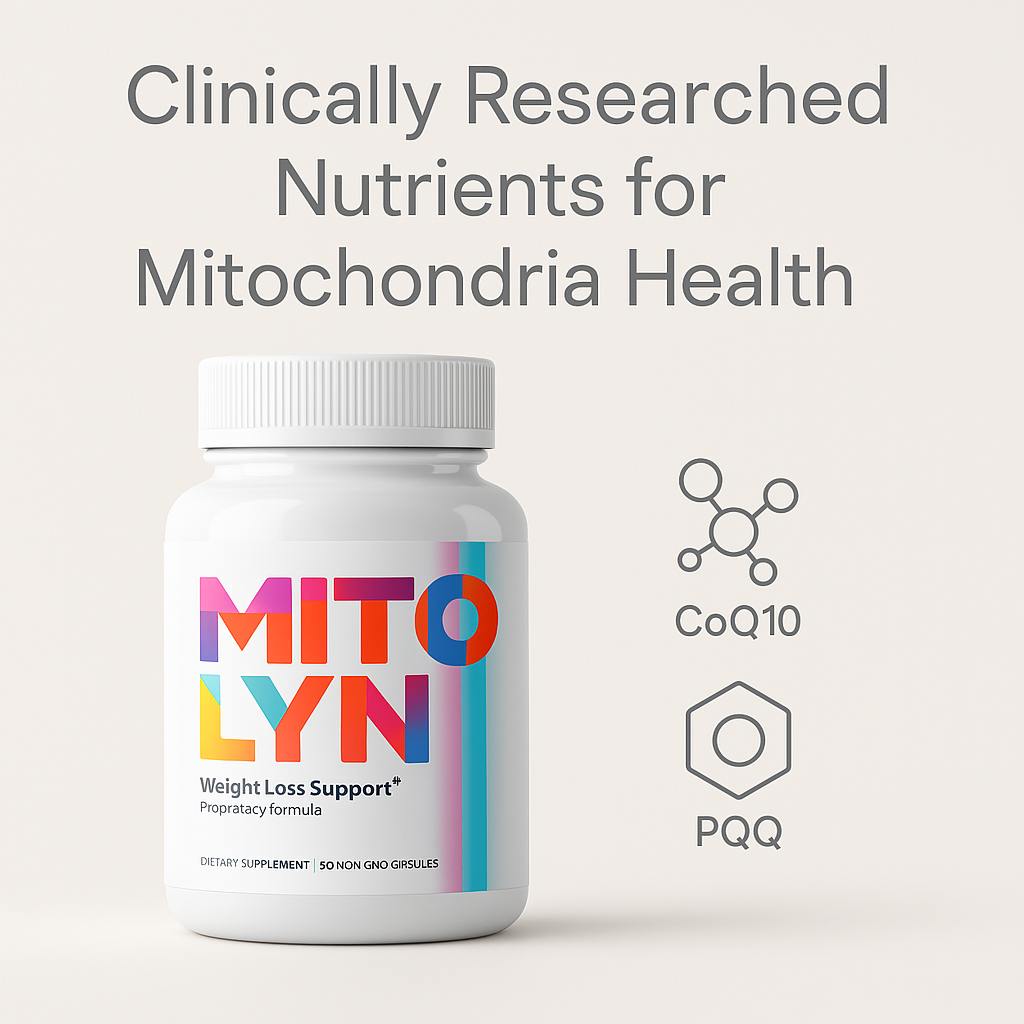
If you’re already eating well and exercising but still struggling with low energy or a slow metabolism, adding targeted nutrients may help optimize how your cells produce and use energy.
Supplements that contain ingredients like CoQ10, PQQ, and L-carnitine are popular because they support the mitochondria’s role in turning fat into fuel.
👉 Mitolyn combines clinically researched nutrients like CoQ10 and PQQ to help optimize mitochondrial function for better metabolism and more effective fat burning.
“Read the full Mitolyn review.”
Always check with your healthcare provider before adding any new supplement to your routine.
Practical Tips to Support Mitochondria for Weight Loss
If you want to help your mitochondria work more efficiently for better fat burning, here are some simple lifestyle habits that really make a difference:
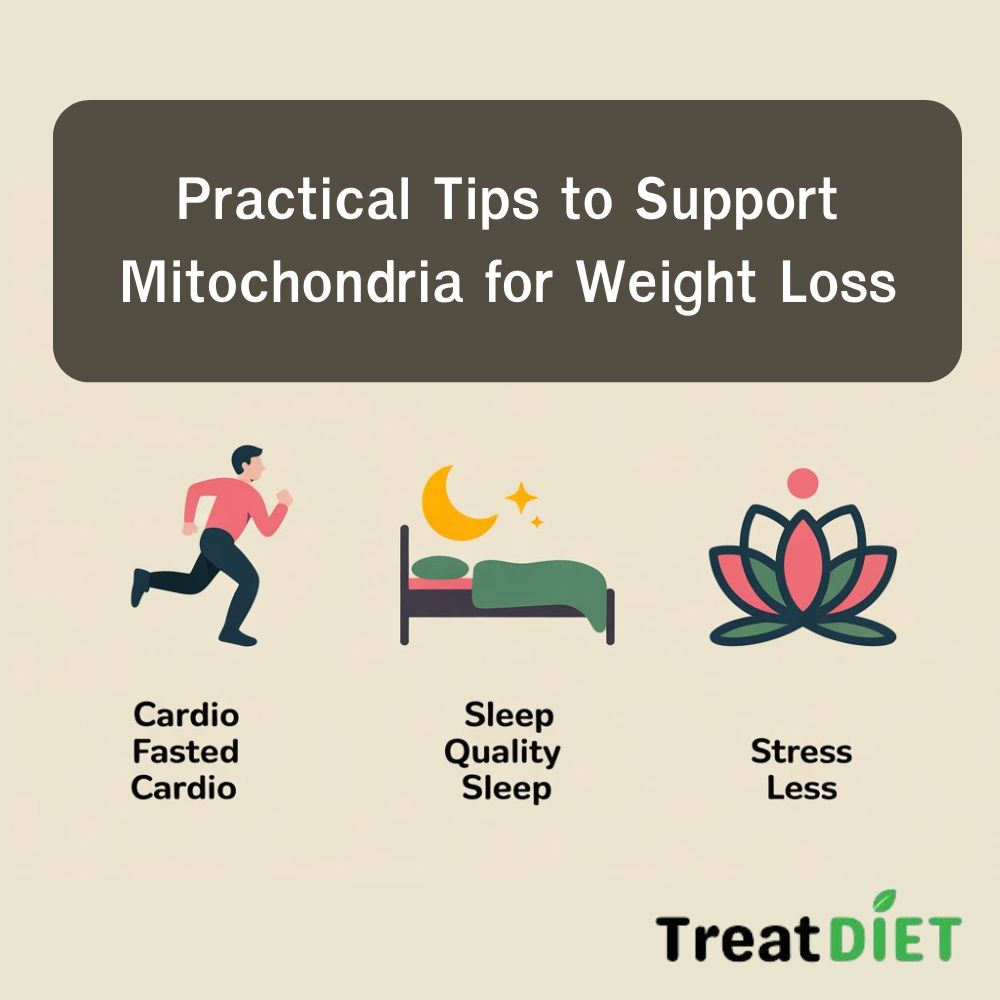
✔️ Try fasted cardio: Doing light cardio (like brisk walking or cycling) in a fasted state — such as first thing in the morning before breakfast — may help your body tap into stored fat more effectively.
✔️ Prioritize quality sleep: Deep, restorative sleep is when your body repairs and regenerates cells — including your mitochondria. Aim for at least 7–9 hours of good sleep each night.
✔️ Manage stress: Chronic stress can create excess oxidative damage, which harms mitochondria over time. Practice stress-relieving habits like meditation, yoga, or even a daily walk in nature to help protect your cells.
Little changes like these can give your mitochondria the support they need to help your metabolism run at its best.
Want more science-backed ways to boost mitochondria naturally? Check our full guide here.
FAQS
Do mitochondria really affect weight loss?
Yes — mitochondria are the “powerhouses” of your cells, they burning fat to producing the energy your body needs. Poor mitochondrial function can slow down your metabolism, making fat loss harder.
What foods boost mitochondria for fat burning?
Leafy greens, fatty fish, healthy fats like nuts and seeds, and even moderate black coffee can help your mitochondria work better and support fat metabolism.
Which supplements are best for mitochondria health?
Some research-backed nutrients include CoQ10, PQQ, and L-carnitine. These can help mitochondria produce energy more efficiently. Always talk to your doctor before taking supplements.
What are the symptoms of poor mitochondrial function?
Signs include feeling tired all the time, struggling to lose weight even with diet and exercise, and feeling unusually hungry or craving sugar.
Does more mitochondria mean faster metabolism?
Yes — generally, having more healthy mitochondria means your cells can produce more energy (ATP) efficiently, which can help speed up your metabolism. Active people and trained muscles tend to have higher mitochondrial density, which supports better fat burning and energy use.
Do thin people have more mitochondria?
Not always — but fit, active people often have healthier or more efficient mitochondria in their muscles. Genetics, diet, activity level, and lifestyle all affect how well your mitochondria work. More mitochondria can help burn fat and calories more effectively.
What exercise is best for mitochondria?
Aerobic exercises like brisk walking, cycling, and swimming are excellent for boosting mitochondria because they stimulate mitochondrial biogenesis — the creation of new mitochondria in muscle cells. High-intensity interval training (HIIT) and strength training also help strengthen and grow mitochondria over time.
Do mitochondria break down carbs?
Yes — mitochondria use carbs, fats, and even some proteins to make ATP (your body’s energy currency). They convert glucose from carbs through cellular respiration into usable energy, so healthy mitochondria are key for balanced metabolism and stable energy.
How do I boost mitochondria?
You can support healthy mitochondria by eating nutrient-rich foods like leafy greens, healthy fats, and whole grains. Regular exercise, good sleep, and stress management also help. Certain supplements like CoQ10, PQQ, and L-carnitine may support mitochondrial function too. Always check with your doctor before adding supplements.
What foods are bad for your mitochondria?
Highly processed foods, excess sugar, and trans fats can damage mitochondria over time by increasing oxidative stress and inflammation. Too much alcohol can also harm mitochondria. Focus on whole, unprocessed foods to protect your cells and boost your metabolism.

